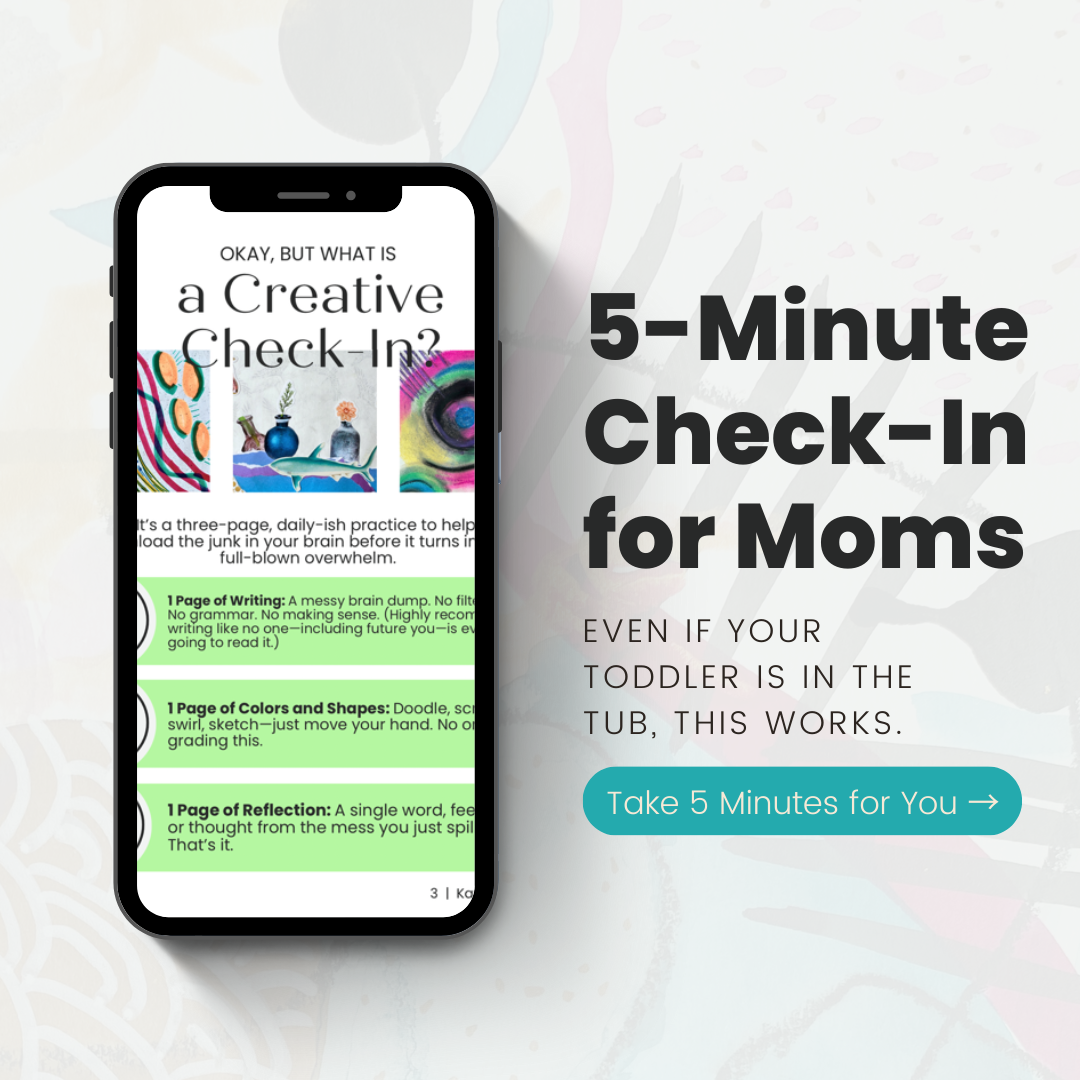76. The Myth of the Always-Regulated Mother: Why Perfect Emotional Control is Impossible (And That's Okay)
The moment I slammed my hands on the dinner table, I knew my emotional regulation had abandoned me. I'd reached my breaking point.
The rapid-fire conversation between my husband, kids, and whoever else was in the room had turned into a chaotic symphony of "What happened at school?" overlapping with "Who's going fishing?" while someone else chimed in about platypus’. YES platypuses.
My ADHD brain couldn't process one more piece of information. So I did what any overwhelmed mother does when her nervous system hits overload: I lost it.
"Enough! I need everybody to be quiet for 30 seconds. That's all I ask. Thirty seconds where it's not rapid-fire everything."
And everyone was quiet, then came the shame spiral.
I should be more regulated.
I should be able to handle normal family conversation.
Good mothers don't slam their hands on tables.
Sound familiar?
If you've ever felt like a failure because you couldn't maintain perfect emotional regulation while managing the bittersweet chaos of motherhood, this one's for you.
As a Registered Social Worker and Expressive Arts Therapist based in Leduc, Alberta, I've seen firsthand how the pressure to maintain perfect emotional regulation can actually harm maternal mental health. That's exactly what I discovered in my recent conversation with fellow Leduc mama, Charlie Webb - a Registered Psychotherapist who specializes in nervous system regulation and emotional wellness. The expectation to be regulated all the time isn't just unreasonable - it's biologically impossible.
Why Your Nervous System Wasn't Built for Modern Motherhood
Let's start with the science that'll make you feel so much better about your last meltdown.
The Generational Impact on Today's Alberta Mothers
Our nervous systems retain information from five to seven generations.
Think about what life looked like for mothers five to seven generations ago.
They had villages for support that simply don't exist anymore.
They spent time in natural surroundings instead of urban environments buzzing with constant stimulation.
Here's the kicker: research estimates that in one week of living in an urban center, we consume roughly the same amount of stimuli through our nervous systems as our ancestors did in their entire lifetimes.
Read that again. One week equals a lifetime of stimuli.
Prefer to watch? Catch the video version of this conversation on YouTube.
The Science Behind Feeling "Touched Out"
No wonder you feel "touched out," overwhelmed, and overstimulated. Your nervous system is literally trying to process more information than it was designed to handle. When your child wants a hug and you say "no more," it's not just about the physical touch. It's your body saying, "I cannot process any more information right now."
This includes the TV that's too loud, the unexpected door slam, the endless mental load of remembering who needs what when. Your nervous system is maxed out, and that's not a personal failing - it's biology.
The Shame Spiral That Keeps Canadian Mothers Stuck
Here's where it gets tricky. The moment we recognize we're dysregulated, shame often swoops in like an unwelcome guest.
"I should be able to handle this."
"Good mothers don't lose it over normal conversation."
"All the mom influencers say I need to be fully present and regulated all the time."
When "Should" Becomes a Shame Word
Should is a shame word. Every time we tell ourselves we "should" be different, we trigger a shame response that actually makes it harder to access the tools that could help us regulate.
Social media doesn't help. Those perfectly curated posts about mindful parenting and constant emotional availability fuel our perfectionist tendencies, creating unrealistic black-and-white thinking. We believe we should be calm all the time or we're failing completely.
But… unless you're a robot, constant regulation is completely unrealistic.
The STOP Tool for Moms: An Emotional Regulation Reset Button
When Charlie shared this tool with me during our conversation here in Leduc at our co-working space, The Lighthouse, my first thought was, "Are you kidding me? It's that simple?" But then I remembered the grocery store dad who said parenting is like the Super Bowl - you don't practice at the Super Bowl, you perform there. You practice at home so you can perform when it matters.
The STOP tool from Dialectical Behavioral Therapy is exactly that kind of practice:
Breaking Down the STOP Technique
S - STOP what you're doing. Mid-sentence, mid-dishwashing, mid-yell. Just stop.
T - TAKE a step back. Physically remove yourself if possible. Become the observer instead of the reactor.
O - OBSERVE your thoughts, feelings, and body sensations. What stories are you telling yourself? What should you be doing or shouldn't be doing? Where do you feel tension, tightness, or energy in your body?
P - PROCEED mindfully. Ask yourself: What do I want the outcome of this situation to be? How do I get there instead of continuing on the trajectory I was on?
This isn't about perfect execution. It's about creating space between stimulus and response so you can choose your next move instead of being hijacked by your nervous system.
Why "Just Take a Deep Breath" Actually Works (When You Practice)
I know, I know…. When someone tells you to "just breathe" in the middle of a meltdown, it feels dismissive. But here's the science that makes it less infuriating:
The Parasympathetic Response Explained
When you hold an inhale or lengthen your exhale, you create a parasympathetic response that kicks your nervous system out of overdrive immediately.
It allows your mind and body to reconnect so you're not being driven purely by emotion.
The key? Practice when you're already calm. Practice the breathing, the STOP tool, the stepping outside, whatever works for you. Practice so that when you really need it, it's familiar instead of foreign.
Reframing "Dysregulation" as Normal Human Experience
What if I told you that anxiety is good and necessary when it's proportionate to the situation?
That dissociation - even scrolling on your phone for five minutes in the bathroom - can be a helpful coping mechanism when you're about to lose it with your kids?
Working With Your Nervous System, Not Against It
Our nervous systems are designed to ebb and flow with our surroundings. The goal isn't to eliminate all emotional responses; it's to work with your body instead of against it.
Sometimes you need to stand at a wall for five minutes.
Sometimes you need silence.
Sometimes you need to ask your partner to step in.
These aren't failures - they're your nervous system asking for what it needs.
The Complexity Trap: How We Over-Complicated Parenting
Between research, social media, and endless parenting philosophies, we've made motherhood far more complex than it needs to be. We feel pressure to define ourselves by a parenting style, to follow specific methods, to be everything to everyone at all times.
But what if we brought it back to the biological basics?
What do you need? What do your children need? How can you meet those needs without all the labels and shame?
The truth is, attuned parenting isn't about perfection. It's about recognizing when you're overwhelmed, honoring that feeling, and responding in a way that aligns with who you want to be in that moment.
Your Dysregulated Moments Don't Define You
The next time you slam your hands on the table, lose your patience, or need everyone to just be quiet for thirty seconds, remember this: you're not broken. You're not failing.
You're a human being with a nervous system that's doing its best in a world it wasn't designed for.
Your worth as a mother isn't measured by your ability to remain calm in every moment.
It's measured by your willingness to show up, to repair when needed, and to keep trying even when it's hard.
So take the deep breath (when you remember to). Practice the STOP tool. Give yourself permission to step away when you need space. And please, please stop should-ing all over yourself.
You're already doing better than you think you are.
Copy and Paste these journal prompts into your notes app before you go:
What does dysregulation feel like in your body? Can you identify your early warning signs?
What simple regulation tool resonates most with you to practice this week?
How would you speak to a friend going through what you experienced in your last overwhelming moment?
What outcome do you want the next time you feel overwhelmed, and what might help you get there?
Chill Like a Mother Podcast Guest:
If you're in the Leduc area and resonated with this conversation, both Charlie and I are currently accepting new clients.
You can connect with Charlie at Nurtured Minds Wellness for individual therapy, couples counseling, or specialized work in emotional regulation and trauma. She offers both in-person sessions in Leduc and Calmar, as well as virtual sessions across Canada.
About Kayla: Kayla Huszar is a Registered Social Worker and Expressive Arts Therapist based in Leduc, Alberta, who helps millennial mothers rediscover their authentic selves through therapeutic art and storytelling. She believes that creativity and self-expression are essential for maternal mental health and identity.
About Charlie: Charlie Webb is a Registered Psychotherapist (CRPO) and Counselling Therapist (ACTA) at Nurtured Minds Wellness. Based in Leduc, Alberta, Charlie specializes in helping adolescents (15+), adults, and couples navigate anxiety, depression, trauma, life transitions, and emotional regulation using a holistic approach that incorporates DBT, CBT, EFT, and other evidence-based modalities.
Related Reading:
5 Questions to Ask When Trying to Parent Differently Feels Impossible
ADHD Mom Identity Crisis: A Raw Guide to Reclaiming Yourself in Motherhood
📤 Share this post: Help another overwhelmed mama feel less alone by sharing this on your socials
Disclaimer: This site contains some affiliate links. I get a little moola in exchange for creating this content and you get cool book and product recommendations at no extra cost to you!
This information is for educational purposes only. Kayla cannot provide personalized advice or recommendations for your unique situation or circumstances. Therefore, nothing on this page or website should replace therapeutic recommendations or personalized advice. If you require such services, please consult with a medical or therapeutic provider to determine what's best for you. Kayla cannot be held responsible for your use of this website or its contents. Please never disregard or delay seeking medical or therapeutic treatment because of something you read or accessed through this website.
© 2024 Kayla Huszar - All Rights Reserved.





